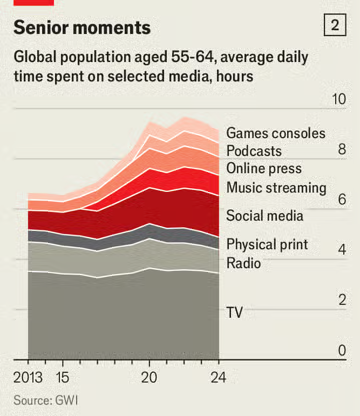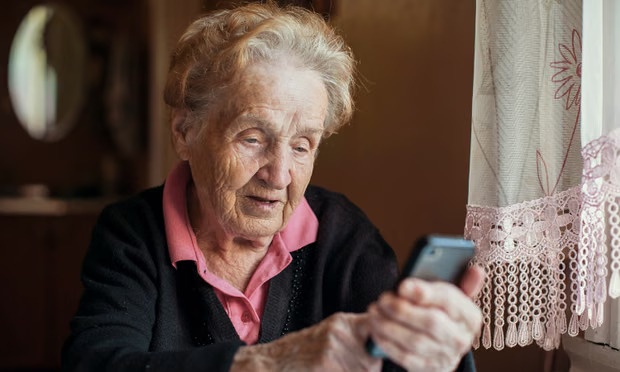 |
Older people are increasingly accessing technology. Photo: Panos Pictures . |
Since the UK's National Centre for Gaming Disorder opened in 2019, hundreds of young people have come forward.
But recently, the clinic has been seeing a different group of patients: older adults. Experts have treated 67 people over 40 who are addicted to gaming, the oldest of whom is a 72-year-old woman who is addicted to playing games on her smartphone.
Phone "addict"
According to the Economist , an important trend often overlooked by analysts is the sharp increase in phone usage time among the elderly - a group that is considered slow to adopt technology.
While the media has focused mainly on warning teenagers about the negative effects of technology, the elderly have been showing a sudden increase in screen addiction in recent years.
According to Ofcom, the UK government 's communications agency, older people have long been a group with high entertainment needs. People over 75 in the UK watch more than 5.5 hours of TV a day. A decade ago, only 1 in 5 Americans over 65 owned a smartphone; that number has now skyrocketed. Even recently retired people are the most enthusiastic technology adopters.
 |
The amount of time older people spend in front of screens has skyrocketed since 2013. Photo: The Economist. |
Statistics from research firm GWI show that people over 65 have a higher rate of owning tablets, smart TVs, e-readers and PCs/Laptops than people under 25. Technology corporations also adjust their products, typically Apple with the Apple Watch product with the function of measuring electrocardiograms and calling emergency services in case of falls. Currently, 17% of people over 65 own smart watches.
As device ownership increases, so does screen time. By 2024, Britons over 65 will spend more than three hours a day online on smart devices.
Combining TV viewing and smart device use, this retiree age group recorded more daily screen time than both young adults and children.
In South Korea, a 2022 study estimated that 15% of people aged 60-69 are at risk of phone addiction. Dr. Ipsit Vahia, head of the Technology and Aging Laboratory at McLean Hospital, noted that some older adults “increasingly live their lives through their phones, just like teenagers.”
Risks, Benefits and Management
The use of technology presents both risks and benefits for older people. A major risk is financial, as mobile devices are often linked to bank accounts. Online gaming top-ups and scams are particularly targeted at this age group. Dr Vahia warns that WhatsApp has become a popular platform for scams in many countries, as older people use the app extensively.
It is worth noting that older adults are not often reminded to regulate their phone usage time, unlike parental and teacher supervision of adolescents.
“For older people, sometimes there’s no one around, or if there is, no one really paying attention to what they’re doing on the computer,” says Henrietta Bowden-Jones, a gaming clinic specialist in the UK.
Dr. Vahia’s clinic points to screen time as a root cause of health issues like insomnia (caused by fear of online scams) or anxiety (caused by “negative news surfing”). Older adults are also vulnerable to misinformation, with them being twice as likely to use news apps as those under 25.
 |
Research from the UT Health Austin Memory Center shows that older adults who regularly use smartphones have lower rates of cognitive decline. Photo: De Visu/Alamy. |
However, the benefits of technology are huge, especially for older people who are lonely or have limited mobility. The power of the internet is invaluable, allowing them to participate in social activities via Zoom, exercise online and attend club activities remotely.
Professor Bowden-Jones said the ability to pursue hobbies online was great for people who couldn't get out.
The consequences of excessive technology use among older people are also considered less serious than among teenagers. With more free time in retirement, the main risk is that time loss does not lead to job loss or a decline in academic performance.
Notably, a recent meta-analysis of 400,000 older adults found that those who regularly used digital devices had lower rates of cognitive decline.
This digital trend is expected to continue, with Virtual Reality (VR) technology seen as the next frontier. Dr. Vahia has used VR to support depressed patients by arranging virtual walks through meaningful places, to evoke memories and soothe the patient’s spirit.
Source: https://znews.vn/nhung-con-nghien-dien-thoai-thuc-su-post1597415.html





![[Photo] President Luong Cuong attends the 80th Anniversary of the Traditional Day of the Armed Forces of Military Region 3](https://vphoto.vietnam.vn/thumb/1200x675/vietnam/resource/IMAGE/2025/10/28/1761635584312_ndo_br_1-jpg.webp)





















![[Photo] The 5th Patriotic Emulation Congress of the Central Inspection Commission](https://vphoto.vietnam.vn/thumb/1200x675/vietnam/resource/IMAGE/2025/10/27/1761566862838_ndo_br_1-1858-jpg.webp)
![[Photo] Party Committees of Central Party agencies summarize the implementation of Resolution No. 18-NQ/TW and the direction of the Party Congress](https://vphoto.vietnam.vn/thumb/1200x675/vietnam/resource/IMAGE/2025/10/27/1761545645968_ndo_br_1-jpg.webp)
![[Photo] National Assembly Chairman Tran Thanh Man receives Chairman of the House of Representatives of Uzbekistan Nuriddin Ismoilov](https://vphoto.vietnam.vn/thumb/1200x675/vietnam/resource/IMAGE/2025/10/27/1761542647910_bnd-2610-jpg.webp)







































































Comment (0)